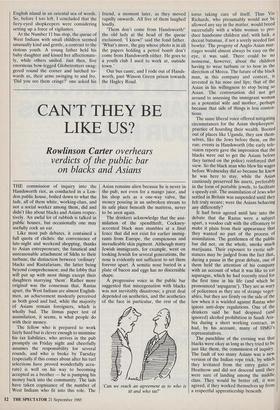CAN'T THEY BE LIKE US?
Rowlinson Carter overhears
verdicts of the public bar on blacks and Asians
THE commission of inquiry into the Handsworth riot, as conducted in a Lon- don public house, boiled down to what the lads, all of them white, working-class, and not a social worker among them, did and didn't like about blacks and Asians respec- tively. An awful lot of rubbish is talked in public houses, but occasionally one may usefully cock an ear.
Like most pub debates, it contained a full quota of clichés: the convenience of late-night and weekend shopping, thanks to Asian entrepreneurs; the fanatical and unreasonable attachment of Sikhs to their turbans; the distinction between 'ordinary' blacks and Rastafarians, the latter being beyond comprehension; and the lobby that will put up with most things except their daughters marrying 'them'. Rather more original was the consensus that, Rastas apart, the West Indians are almost English- men, an achievement modestly perceived as both good and bad, while the majority of Asians remain foreigners, which is wholly bad. The litmus paper test of assimilation, it seems, is what people do with their money.
The fellow who is prepared to work fairly hard but is clever enough to minimise his tax liabilities, who arrives in the pub promptly on Friday night and cheerfully assumes the responsibility for several rounds, and who is broke by Tuesday (especially if this comes about after his turf selections have proved wonderfully accu- rate) is well on his way to becoming accepted as a brother — he is pumping his money back into the community. The lads have taken cognisance of the number of West Indians who fit into this role. The Asian remains alien because he is never in the pub, not even for a mango juice, and his shop acts as a one-way valve, 'the money pouring in an unbroken stream to its safe place beneath the mattress, never to be seen again.
The drinkers acknowledge that the assi- milation of the spendthrift, Cockney- accented black man stumbles at a final fence that did not exist for earlier immig- rants from Europe, the conspicuous and ineradicable skin pigment. Although many Jewish immigrants, for example, went on looking Jewish for several generations, the nose is evidently not sufficient to set them forever apart. A semitic nose buried in a plate of bacon and eggs has no discernible shape.
A progressive voice in the public bar suggested that miscegenation with blacks was not inevitably disastrous; a great deal depended on aesthetics, and the aesthetics of the face in particular, the rest of the 'Can we reach an agreement as to who is tit and who tat?' torso taking care of itself. Thus Viv Richards, who presumably would not be allowed any say in the matter, would breed successfully with a white woman to pro- duce handsome children and, with luck, a decent batsman, if not a sorely needed fast bowler. The progeny of Anglo-Asian mar- riages would almost always be easy on the eye, it was said. There could be no nonsense, however, about the children having to wear turbans or to bow in the direction of Mecca. The future of the black man, in this company and context, Is invested in his nose and lips; that of the Asian in his willingness to stop being so Asian. The conversation did not get around to assessing the immigrant woman as a potential wife and mother, perhaps because that side of things is less conten- tious.
The same liberal voice offered mitigating circumstances for the Asian shopkeepers' practice of hoarding their wealth. Booted out of places like Uganda, they saw them- selves, like the Jews before them, on the run; events in Handsworth (the early tele- vision reports gave the impression that the blacks were out to get the Asians before they turned on the police) reinforced that view. So the black man who blew his wages before Wednesday did so because he knew he was here to stay, while the Asian cautiously preserved his assets, preferably in the form of portable jewels, to facilitate a speedy exit. The assimilation of Jews who settled in Britain was suspended until they felt truly secure; were the Asians behaving any differently?
It had been agreed until late into the debate that the Rastas were a subject apart, a voodoo cult with the effrontery to make it plain from their appearance that they wanted no part of the process of assimilation. The gentlemen of the public bar did not, on the whole, smoke much marijuana. Their exposure to exotic sub- stances may be judged from the fact that, during a pause in the great debate, one of them held the attention of his company with an account of what it was like to eat asparagus, which he had recently tried for the first time in his life (and which he pronounced `aspagarus'). They are as wary of policemen as they are of strange veget- ables, but they are firmly on the side of the law when it is wielded against Rastas who ignore anti-dope regulations. One of the drinkers said he had despised (and ignored) alcohol prohibition in Saudi Ara- bia during a short working contract, as had, by his account, many of HMG's representatives.
The punchline of the evening was that blacks were okay as long as they tried to be just like them, the commission of inquiry. The fault of too many Asians was a new version of the Indian rope trick, by which they levitated from the entry gates at Heathrow and did not descend until they were sure of landing among the middle class. They would be better off, it was agreed, if they worked themselves up from a respectful apprenticeship beneath.














































 Previous page
Previous page